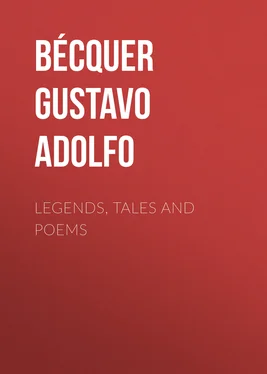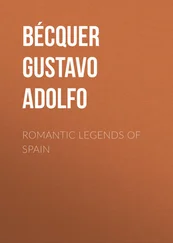Gustavo Bécquer - Legends, Tales and Poems
Здесь есть возможность читать онлайн «Gustavo Bécquer - Legends, Tales and Poems» — ознакомительный отрывок электронной книги совершенно бесплатно, а после прочтения отрывка купить полную версию. В некоторых случаях можно слушать аудио, скачать через торрент в формате fb2 и присутствует краткое содержание. Жанр: foreign_prose, literature_19, foreign_antique, на английском языке. Описание произведения, (предисловие) а так же отзывы посетителей доступны на портале библиотеки ЛибКат.
- Название:Legends, Tales and Poems
- Автор:
- Жанр:
- Год:неизвестен
- ISBN:нет данных
- Рейтинг книги:5 / 5. Голосов: 1
-
Избранное:Добавить в избранное
- Отзывы:
-
Ваша оценка:
- 100
- 1
- 2
- 3
- 4
- 5
Legends, Tales and Poems: краткое содержание, описание и аннотация
Предлагаем к чтению аннотацию, описание, краткое содержание или предисловие (зависит от того, что написал сам автор книги «Legends, Tales and Poems»). Если вы не нашли необходимую информацию о книге — напишите в комментариях, мы постараемся отыскать её.
Legends, Tales and Poems — читать онлайн ознакомительный отрывок
Ниже представлен текст книги, разбитый по страницам. Система сохранения места последней прочитанной страницы, позволяет с удобством читать онлайн бесплатно книгу «Legends, Tales and Poems», без необходимости каждый раз заново искать на чём Вы остановились. Поставьте закладку, и сможете в любой момент перейти на страницу, на которой закончили чтение.
Интервал:
Закладка:
[Footnote 1: Obras , vol. II, p. 251.]
Indeed, in those later days of trial and hardship, he would often look out wearily upon Madrid, the city of his adoption, the scene of his crushing struggle with necessity, as it lay outspread before his windows,—"dirty, black, and ugly as a fleshless skeleton, shivering under its immense shroud of snow,"[1] and in his mind he would conjure up the city of his youth, his ever cherished Seville, "with her Giralda of lacework, mirrored in the trembling Guadalquivir, with her narrow and tortuous Moorish streets, in which one fancies still he hears the strange cracking sound of the walk of the Justiciary King; Seville, with her barred windows and her love-songs, her iron door-screens and her night watchmen, her altar-pieces and her stories, her brawls and her music, her tranquil nights and her fiery afternoons, her rosy dawns and her blue twilights; Seville, with all the traditions that twenty centuries have heaped upon her brow, with all the pomp and splendor of her southern nature."[2] No words of praise seemed too glowing for her ardent lover.
[Footnote 1: Ibid ., vol. III, p. iii.]
[Footnote 2: Obras , vol. III, pp. 109–110.]
By some strange mystery, however, it had been decreed by fate that he should only meet with disappointment in every object of his love. The city of his birth was no exception to the rule: since Becquer's death it has made but little effort to requite his deep devotion or satisfy his youthful dreams. You may search "the bank of the Guadalquivir that leads to the ruined convent of San Jerónimo," you may spy among the silvery poplars or the willows growing there, you may thrust aside the reeds and yellow lilies or the tangled growth of morning-glories, but all in vain—no "white stone with a cross" appears. You may wander through the city's many churches, but no tomb to the illustrious poet will you find, no monument in any square. His body sleeps well-nigh forgotten in the cemetery of San Nicolás in Madrid.
If you will turn your steps, however, to the barrio of Seville in which the celebrated D. Miguel de Mañara, the original type of Juan Tenorio and the Estudiante de Salamanca , felt the mysterious blow and saw his own funeral train file by, and will enter the little street of the Conde de Barajas, you will find on the facade of the house No. 26 a modest but tasteful tablet bearing the words
EN ESTA CASA NACIÓ
GUSTAVO ADOLFO
BECQUER
XVII FEBRERO MDCCCXXXVI.[1]
[Footnote 1: This memorial, which was uncovered on January 10th, 1886, is due to a little group of Becquer's admirers, and especially to the inspiration of a young Argentine poet, Román Garcia Pereira (whose Canto á Becquer , published in La Ilustración Artística , Barcelona, December 27, 1886, is a tribute worthy of the poet who inspired it), and to the personal efforts of the illustrious Seville scholar, Don José Gestoso y Pérez. It is only fair to add here that there is also an inferior street in Seville named for Becquer.]
Here Gustavo Adolfo Dominguez Becquer opened his eyes upon this inhospitable world. Eight days later he was baptized in the church of San Lorenzo.[1] He was one of a family of eight sons, Eduardo, Estanislao, Valeriano, Gustavo Adolfo, Alfredo, Ricardo, Jorge, and Jose. His father, Don Jose Dominguez Becquer, was a well-known Seville genre painter. He died when Gustavo was but a child of five, too young to be taught the principles of his art; but he nevertheless bequeathed to him the artistic temperament that was so dominant a trait in the poet's genius. Becquer's mother, Doña Joaquina, survived his father but a short time, and left her children orphaned while they were yet very young. Gustavo was but nine and a half years old at the time of his mother's death. Fortunately an old and childless uncle, D. Juan Vargas, took charge of the motherless boys until they could find homes or employment.
[Footnote 1: The following is a copy of his baptismal record:
"En jueves 25 de Febrero de 1836 años D. Antonio Rodriguez Arenas Pbro. con licencia del infrascrito Cura de la Parroquial de Sn. Lorenzo de Sevilla: bautizó solemnemente á Gustavo Adolfo que nació en 17 de dicho mes y año hijo de José Dominguez Vequer ( sic ) y Doña Juaquina ( sic ) Bastida su legitima mujer. Fué su madrina Doña Manuela Monchay vecina de la collación de Sn. Miguel á la que se advirtió el parentesco espiritual y obligaciones y para verdad lo firmé.—Antonio Lucena Cura." See La Illustración Artística , Barcelona, December 27, 1886, pp. 363–366. Citations from this periodical will hereafter refer to the issue of this date.]
Gustavo Adolfo received his first instruction at the College of San Antonio Abad. After the loss of his mother his uncle procured for him admission to the College of San Telmo, a training school for navigators, situated on the banks of the Guadalquivir in the edifice that later became the palace of the Dukes of Montpensier. This establishment had been founded in 1681 in the ancient suburb of Marruecos as a reorganization of the famous Escuela de Mareantes (navigators) of Triana. The Government bore the cost of maintenance and instruction of the pupils of this school, to which were admitted only poor and orphaned boys of noble extraction. Gustavo fulfilled all these requirements. Indeed, his family, which had come to Seville at the close of the sixteenth century or at the beginning of the seventeenth century, from Flanders, was one of the most distinguished of the town. It had even counted among its illustrious members a Seville Veinticuatro, and no one who was unable to present proof of noble lineage could aspire to that distinction.[1]
[Footnote 1: "Don Martin Becquer, mayorazgo and Veinticuatro , of Seville, native of Flanders, married Doña Úrsula Díez de Tejada. Born to them were Don Juan and Doña Mencia Becquer. The latter married Don Julián Dominguez, by whom she had a son Don Antonio Domínguez y Becquer, who in turn contracted marriage with Doña Maria Antonia Insausti y Bausa. Their son was Don Jose Dominguez Insausti y Bausa, husband of Doña Joaquina Bastida y Vargas, and father of the poet Becquer." The arms of the family "were a shield of azure with a chevron of gold, charged with five stars of azure, two leaves of clover in gold in the upper corners of the shield, and in the point a crown of gold." The language of the original is not technical, and I have translated literally. See Carta á M. Achille Fouquier , by D. Jose Gestoso y Pérez, in La Ilustración Artística , pp. 363–366.]
Among the students of San Telmo there was one, Narciso Campillo, for whom Gustavo felt a special friendship,—a lad whose literary tastes, like his own, had developed early, and who was destined, later on, to occupy no mean position in the field of letters. Writing of those days of his youth, Señor Campillo says: "Our childhood friendship was strengthened by our life in common, wearing as we did the same uniform, eating at the same table, and sleeping in an immense hall, whose arches, columns, and melancholy lamps, suspended at intervals, I can see before me still.
"I enjoy recalling this epoch of our first literary utterance ( vagido ), and I say our , for when he was but ten years old and I eleven, we composed and presented in the aforesaid school (San Telmo) a fearful and extravagant drama, which, if my memory serves me right, was entitled Los Conjurados ('The Conspirators'). We likewise began a novel. I wonder at the confidence with which these two children, so ignorant in all respects, launched forth upon the two literary lines that require most knowledge of man, society, and life. The time was yet to come when by dint of painful struggles and hard trials they should possess that knowledge, as difficult to gain as it is bitter!"[1]
Читать дальшеИнтервал:
Закладка:
Похожие книги на «Legends, Tales and Poems»
Представляем Вашему вниманию похожие книги на «Legends, Tales and Poems» списком для выбора. Мы отобрали схожую по названию и смыслу литературу в надежде предоставить читателям больше вариантов отыскать новые, интересные, ещё непрочитанные произведения.
Обсуждение, отзывы о книге «Legends, Tales and Poems» и просто собственные мнения читателей. Оставьте ваши комментарии, напишите, что Вы думаете о произведении, его смысле или главных героях. Укажите что конкретно понравилось, а что нет, и почему Вы так считаете.












